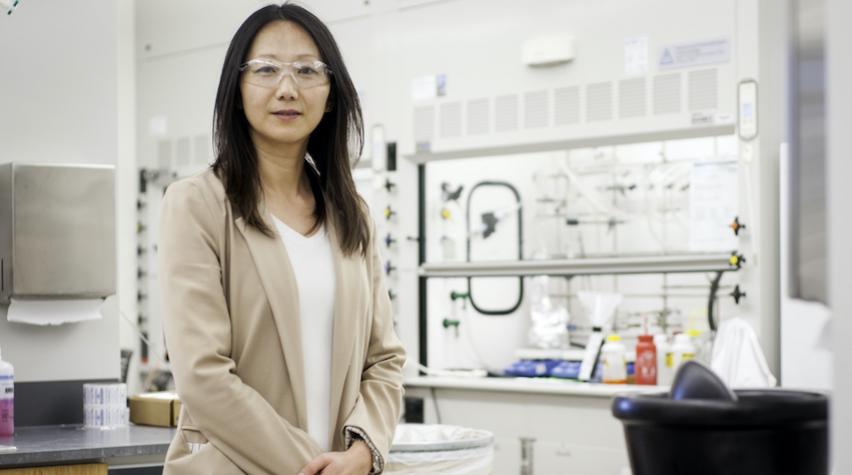
This fall, ChEnected is introducing readers to the recipients of AIChE’s 2021 Institute and Board of Directors’ Awards. These are AIChE’s highest honors, and recipients are nominated by the chemical engineering community and voted upon by the members of AIChE’s volunteer-led Awards Committee. The awards acknowledge outstanding achievements across a spectrum of chemical engineering endeavors.
Alpha Chi Sigma Award
The Alpha Chi Sigma Award recognizes outstanding accomplishments in fundamental or applied chemical engineering research, and is sponsored by the Alpha Chi Sigma Educational Foundation and the Alpha Chi Sigma Fraternity.
The recipient of the 2021 Alpha Chi Sigma Award is Zhenan Bao, Department Chair and K.K. Lee Professor of Chemical Engineering at Stanford University.
Dr. Bao is being honored “for her pioneering work and leadership in the development of organic electronic materials and their applications to skin-inspired electronics.”
Inspired by the properties of human skin, Bao has pursued her hypothesis that electronic devices designed to mimic skin-like properties could revolutionize the ways that humans interact with ubiquitous electronics in their surroundings. She has since pioneered molecular design concepts for organic electronic materials, enabling products such as flexible electronic circuits and displays. She has documented her work in more than 600 publications and over 130 U.S. patents.
Zhenan Bao and the other Institute and Board of Directors’ Award recipients will receive their prizes at the 2021 AIChE Annual Meeting, November 7–11 in Boston, Massachusetts. A video presentation of the awards will be available for viewing the following week at a virtual version of the Annual Meeting.
I hypothesized that, if I was able to mimic the functions and properties of human skin in an electronic device, we might fundamentally change the form factors of future electronics, and revolutionize how humans interact with electronics, our surroundings, and with each other.
About Bao
In 2016, Bao established Stanford’s Wearable Electronics Initiative (eWEAR), and serves as its faculty director. Prior to joining Stanford in 2004, she was a Distinguished Member of Technical Staff at Bell Labs, Lucent Technologies. She received her PhD in Chemistry from the University of Chicago.
Bao is a member of the National Academy of Engineering, the American Academy of Arts and Sciences, and the National Academy of Inventors. In addition to receiving AIChE’s Andreas Acrivos Award for Professional Progress in Chemical Engineering in 2014, her honors include the Material Research Society’s Mid-Career Award, the inaugural American Chemical Society (ACS) Central Science Disruptor and Innovator Prize, the Wilhelm Exner Medal from the Austrian Federal Minister of Science 2018, the ACS Award in Applied Polymer Science, and the For Women in Science Award in the Physical Sciences from L'Oréal-UNESCO. She is also co-founder of two Silicon Valley venture start-ups, C3 Nano and PyrAmes.
Bao’s story
Dr. Bao explained that, since starting her career at Bell Labs, her goal has been to revolutionize electronics so that they can assist humans seamlessly and autonomously.
“I found my scientific inspirations in nature — especially in human skin, which combines sensing functions, signal processing, and unique materials properties such as stretchability, self-healing and biodegradability. I hypothesized that if I was able to mimic the functions and properties of human skin in an electronic device, we might fundamentally change the form factors of future electronics, and revolutionize how humans interact with electronics, our surroundings, and with each other.
We started by developing the necessary materials, because skin-like electronic materials did not yet exist. Next, we made sensors to mimic the skin’s sense of touch, and transistor circuits for signal conditioning. Our electronic systems initially contained only a few transistors. Later, up to 350 transistors/cm2. More recently, we have improved to 42,000 transistors/cm2. We are now using our materials for building displays, batteries, and wireless sensing devices. Our skin-like electronic systems can also provide non-invasive interfaces with the skin, the heart, the nervous system, and other organs. We are currently making functional materials inside the brain using genetically targeted chemical assembling.”
Bao concluded by acknowledging the creative work of her students and many mentors and collaborators for contributing to this progress.
“The rewarding interactions with them made the scientific discoveries even more satisfying.”
Stay in the know
In the weeks leading up to the 2021 AIChE Annual Meeting ChEnected will feature the other 2021 Institute and Board of Directors’ Award recipients. Visit the ChEnected series regularly to meet all of this year’s honorees.


